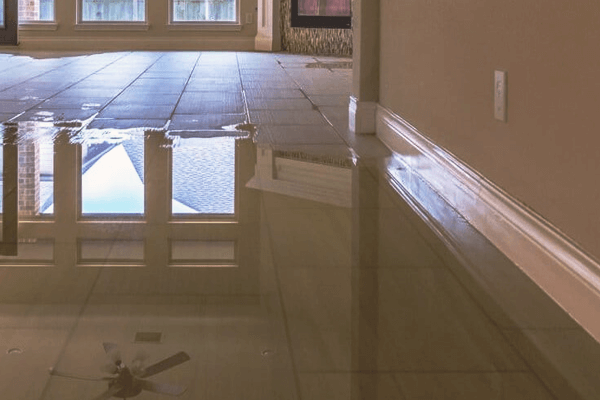Water, just like fire, is a good servant but a bad master. One of the most common causes of water being a bad master is when it causes damage to your home. Your roof got bashed in by a tree due to a thunderstorm? A heavy rain outpour created a leaking hole in your roof? You’re no different from the 14,000 homeowners who experience water damage on any given day.
For home insurance owners, the billion-dollar question after water damage is “will my homeowner insurance cover the damage?”. Well, you’re about to find out.
The Answer is…….
Yes, homeowners insurance does cover water damage from rain. However, before you scurry off to call your insurer, there are a few conditions to getting coverage for water damage from rain. These conditions are explained in detail below.

What you’ve been missing
How to Clean Mold in Carpet from Water Damage
How to Fix a Septic Tank Full of Water When It Rains
Water Coming Up From Basement Drain After Rain
What Type of Rain Water Damage Does Homeowner Insurance Cover?
An HO-3 is considered the most common type of homeowners insurance; hence we will use it as the standard here. When it comes to coverage for water damage from rain, two words are important: sudden and intentional. This means that the source of the water damage must not be caused intentionally and must not be a gradual deterioration process.
You’re probably thinking, “nobody controls rain, so the company should cover it in all cases.” Unfortunately, this is not so. The insurance firm checks the source through which the rainwater makes it into your house. So, if the rain enters your home through a covered peril in your insurance policy, then the insurance company covers your damages.
However, if the rain makes it into your home from another source such as from leakage in your aged roof, then, your wallet will experience some major deductions.
Here are some examples of water damage from rain that homeowners insurance will cover:
- Sudden roof leaks caused by hails or rainstorms, masses of snow or ice on your roof.
- Damage caused by rain entering your home due to perils on your insurance coverage such as thunderstorms or hurricanes
- A tree or pole breaking your roof or window due to heavy rain or thunderstorm
- Mold caused by the entry of rainwater into your home due to damage from perils covered by your insurance.
- Rain enters your home due to damage caused by burglars or vandals while you’re away from home. The insurance company will cover the damage caused by the rain. However, your absence from your home must not be more than 1 – 2 months.
As said earlier, it is not all cases of water damage from rain that insurance companies cover. Below are a few examples of cases where homeowners insurance won’t cover water damage from rain:
- Rain enters your house gradually through a leak caused by the gradual deterioration of your roof or window panes. In this case, the insurance company believes the cause is a reason you could have prevented.
- Rain damages your personal properties because you left a window or door open. This is another preventable occurrence.
- If your house gets flooded due to a heavy rain downpour. To get insured against floods, you need to get a flood insurance policy.
How To File A Claim For Water Damage
Now that you finally know which types of water damage from rain you can get a settlement for, here’s everything you need to know about filing a claim for settlement:
- Inform your insurer as soon as possible about the water damage.
- Take pictures of all the damages and the source of the damage. You should make videos too. Also, if you have pictures of the location before the damage occurred, you should dig those out too.
Next, make a list of all the damages and a list of repairs needed. You could get a professional to repair any of the damages needing immediate attention. Assemble the receipts for these as evidence to show your insurer. - Your insurance company will send down an adjuster who will assess the damage and then make an estimate of the amount your insurance company will pay. However, this fee might be quite low compared to the actual cost. You could get a private professional to help you estimate the cost of the damage repair. This will give you an idea of the amount you should push for.
- Wait on your insurer to release the funds for repair. They usually release half of the amount to start and the other half after completion.
- Finally, you should try to keep the picture safe even after the repair and payment of the settlement. This is because some similar cases have seen the growth of mold from the location of damage, even after repair. However, it might be hard to convince the insurer that the mold is from the initial damage. However, the pictures might help in doing just that.
How To Protect Your Home From Water Damage By Rain
You’ll agree with us that your house getting damaged by rain will definitely disturb your way of living. Depending on the amount of damage, you might have to move out of the house or have to spend a while cleaning up the mess afterwards. Hence, to make sure you’re never in that situation, here are a few tips to help out:
Ensure you’re regularly informed about the weather
Weather predictions are very important to protecting your home from damage from natural perils. Make sure you check the weather news regularly to know if you should expect a thunderstorm so you can get adequately prepared.
Make Sure Your Home is Regularly Maintained
In some cases, houses usually budge to damage from rain due to gradual structural disintegration. Regularly get professionals to check various areas of the house to see which part needs repairs. By doing this, you do not only prevent the house but also assure yourself of a settlement if rain ends up damaging your home.
Have emergency numbers and numbers of professionals on your contact
This is very important, especially if you live in an area with a high risk of thunderstorms or other perils. These numbers will be quite useful if you need immediate help.
Conclusion
Your home is your comfort zone and you definitely don’t want that to get damaged from rain. Just in case it does happen, you can get your insurer to pay a large percentage of the money, provided your case isn’t a result of negligence.
